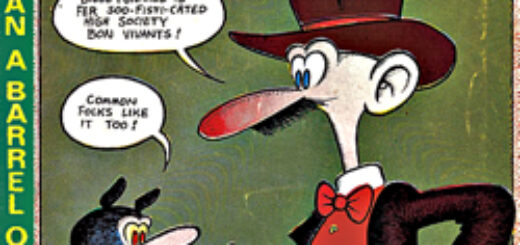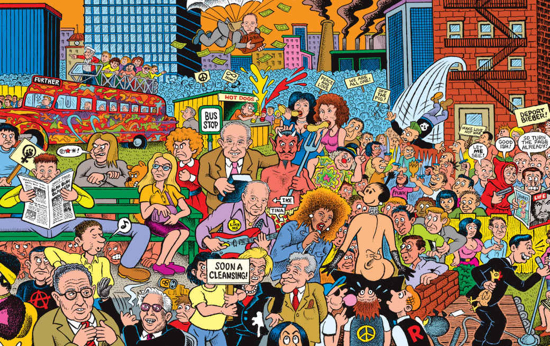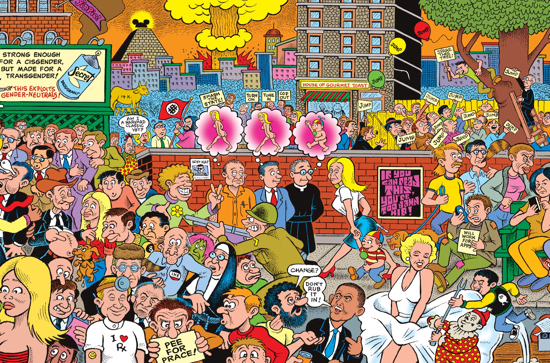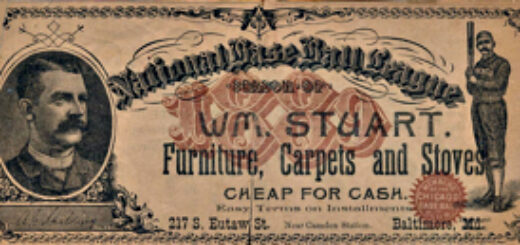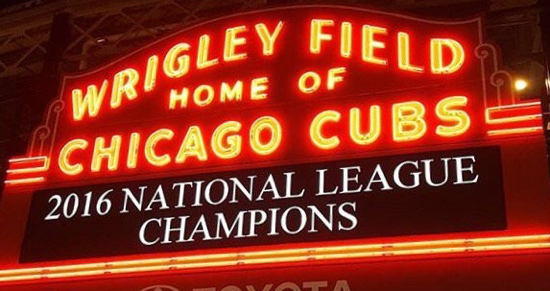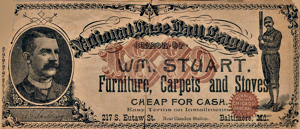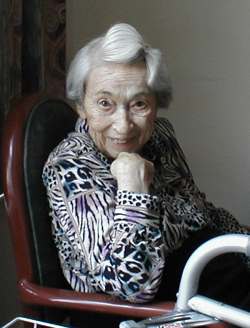Mike Gold: Jay Lynch – Um Tut Sut!
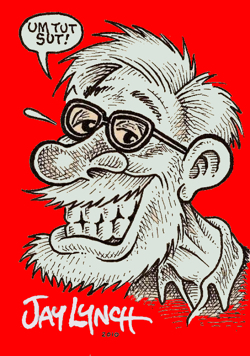
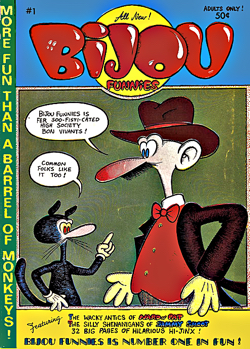 Every town must have a place / Where phony hippies meet / Psychedelic dungeons / Popping up on every street • Frank Zappa, “Who Needs The Peace Corps?”
Every town must have a place / Where phony hippies meet / Psychedelic dungeons / Popping up on every street • Frank Zappa, “Who Needs The Peace Corps?”
The late Sixties really did live up to its reputation. In my home town of Chicago hippie central was the Lincoln Park neighborhood around the iconic Biograph Theater, where, 34 years earlier, the FBI allegedly shot John Dillinger to death. Today, hippies can’t even afford to drive down Lincoln Avenue.
The area sported many blues and folk bars, giving such local talent as Steve Goodman, John Prine, Hound Dog Taylor and Harvey Mandel a place to strut their stuff. It was Mecca to the storefront theater movement, creating world-renown companies such as the Steppenwolf and the Organic Theater a home for newcomer writers and actors like David Mamet, Joe Mantegna, Laurie Metcalf, John Malkovich, and John Ostrander. A mile down the street was The Second City, then-home to John Belushi, Bill Murray, Harold Ramis and dozens of other people who would draw a multicolored mustache on the face of comedy.
A mile further south found you at the office of the underground newspaper the Chicago Seed, a paper so underground it sported a circulation as high as 48,000 copies. I was fortunate to be part of that outfit, initially working under the brilliant editor Abe Peck, who taught me more than any credentialed teacher ever could. Wonderfully, The Seed was across the street from the gargantuan Moody Bible Institute, although I spent more time at the Saucy Weenie scarfing down some great Italian beef and hot dogs.
Creativity flowed down Lincoln Avenue and if you weren’t swimming with that flow you were bathed in amazement. This, in January 1969, is where I first met a one-time Second City employee named Jay Lynch.
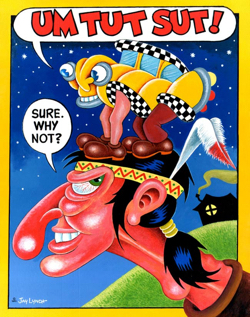 Most certainly, cartoonists benefited from the freedom and opportu
Most certainly, cartoonists benefited from the freedom and opportu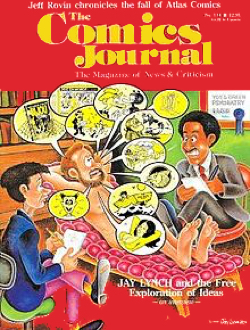 nity that brazenly replaced oxygen. The Chicago Mirror, a black-and-white “counter-culture” magazine that debuted in 1967 and was mostly sold at “head shops” (Google it) such as the Mole Hole. Less than a year later, editor/publisher Lynch turned it into an all-comix publication called Bijou Funnies. It featured the work of Robert Crumb, Art Spiegelman, Gilbert Shelton, Jay Kinney, Justin Green, Kim Deitch, Ralph Reese, Denis Kitchen and his forever pal, Skip Williamson… it, like Zap Comix that premiered shortly before Bijou, was a who’s who of the comix movement.
nity that brazenly replaced oxygen. The Chicago Mirror, a black-and-white “counter-culture” magazine that debuted in 1967 and was mostly sold at “head shops” (Google it) such as the Mole Hole. Less than a year later, editor/publisher Lynch turned it into an all-comix publication called Bijou Funnies. It featured the work of Robert Crumb, Art Spiegelman, Gilbert Shelton, Jay Kinney, Justin Green, Kim Deitch, Ralph Reese, Denis Kitchen and his forever pal, Skip Williamson… it, like Zap Comix that premiered shortly before Bijou, was a who’s who of the comix movement.
As the hippie crusade started to age out, Jay – often known as Jayzey – expanded his horizons. He did color separations and 3-D adaptations for Fred Eychaner, then a printer, a major hippie employer and a contributor to The Seed. Jay was among the many underground artists recruited to write and draw for Topps Inc., contributing to the iconic Bazooka Joe and engaging in a life-long relationship with Wacky Packs and Garbage Pail Kids. In 1976 he created Phoebe and the Pigeon People with Gary Whitney for the Chicago Reader and syndicated to alt-weeklies all over. Several reprint books were published by Kitchen Sink Press; the feature ran for the better part of two decades.
I worked with Jayzey and his BFF Skip Williamson off and on for years, and we saw each other at comics conventions, stockholders’ meetings (that one’s a long and litigious story), and, well, memorials to fallen friends. When FM rock radio and poetry slam pioneer Bob Rudnick died in 1995, a wake was held at Mike James’ famed Heartland Café. It was a wonderful reunion of long-haired gray hairs, and, sadly, was the last time I saw such wonderful people as Marshall Rosenthal and Eliot Wald. Jay was still living in Chicago but I had moved to the New York area nearly ten years previous; we talked for more than an hour catching up and pontificating on the status of the comic art medium and what we should be doing about it. We continued that conversation for 20 years, mostly in bits and pieces at conventions but also through the modern miracle of the Internet.
Jay Lynch died of cancer last Sunday at the age of 72. These days, that’s young enough to be thought of as dying too young. Of course, for vital creators such as Jayzey no age could be too old. Unlike many of us hippies Jayzey eschewed drugs – Denis Kitchen pointed out that was true only if you didn’t count nicotine – but he got chopped down early nonetheless.
Jay Lynch was a quite pioneer. His work speaks for itself; his work screams for itself. A much-loved man, he leaves friends stunned and saddened all over the world.

